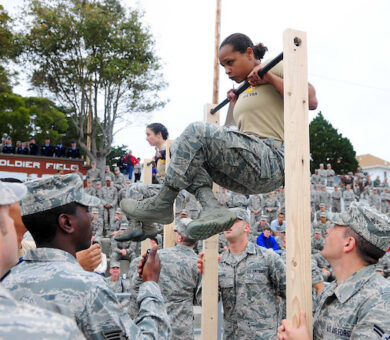How to Know if You Have Leadership Capabilities – Be True to You
Are you considered a leader on your team? If you think you’re a leader, or want to be, here are some identifiers:
- Do your teammates generally follow your lead?
- Do you often think about how to make the team better?
- Do your teammates come to you when they have a problem or a solution?
- Do you feel like you could get your team to do extra work?
- Do you feel like the coaches count on you to help them steer the team?
- Do your coaches often ask you questions on how to find solutions to issues on the team?
- Are you authentic?
These are just some of the identifiers. There are many more. Being a leader comes with a lot of responsibility. Many student-athletes want to be leaders but are not willing to hold themselves or others accountable. Other athletes don’t want the responsibility that leadership requires. Some are scared of the role and don’t have that pressure put on them, especially when things don’t go so well.

What does leadership look like?
Here is a list of some of the characteristics of leaders:
- Puts the team before self
- Serves teammates
- Authentic and genuine
- Positive influence
- Can take a stand on an issue
- Doesn’t take advantage of the role
- Empowers other teammates
- Solution-oriented thinker; finds an answer to solve problems
- Holds self and others accountable
- The same person in front of coaches and players
- Doesn’t say one thing to some team members and something else to others
- Honest and transparent
- Can put herself in the shoes of her teammates and have an understanding
- Confident decision-maker
These are all great characteristics, but not everyone can adhere to them. “Leader” is a great title, but, if you are truly going to lead, you have to sacrifice your own agenda for the team’s agenda. If you are going to lead, then the team comes first. It is harder than it looks, especially when things get tough or you’re in a crisis situation.
You may have already experienced these challenges during this past year in dealing with COVID. It’s a little more difficult to step up and take responsibility when times are tough.

In times of crisis, do you think you can:
- Voice an opinion that is not popular, but you know will help the team?
- Stand by the coach’s choices, even if you don’t fully agree but know they’re the right choices?
- Risk making your teammates angry at you by doing the right thing?
- Step up to take responsibility for the teams’ actions when you know the coaches will be angry?
- Take responsibility for the teams’ play after a loss?
- Talk to the media after a loss and praise the other team and officials?
It’s not easy being the leader, and it does take some practice. Most leaders are always learning and picking up new ideas on how to improve. Most leaders are never satisfied with where they are as leaders.
This doesn’t mean everyone has to be a leader. If you are a leader, that’s great, but, if you’re not, there is no shame in being a great follower or being a “wing-person” to the leader. There are other very important roles on teams that complement each other and assist in the leadership and the outcomes of teams.

Maybe you are a great vocal presence, one of the hardest workers, or the glue to a team. You don’t have to be a leader to assume these roles. Or maybe you are great with pressure situations or you like to help get the team organized or teach the other players the rules of a favorite drill. These roles also don’t require you to be the leader.
There are many characteristics of great teams and leadership is just one of them. In the book Beyond the Talent: Profile of a Winning Team, each of these roles is explained and outlined. When all of these characteristics work in unison, teams reach outcomes beyond what is expected.
You can have any role on your team, but make it a role that fits you and your personality. If that role is the leader, then really work on it. It takes dedication and selflessness to be a great leader. However, if you want to help the team in other ways, there is plenty to do.
The most important thing is to just be the best version of yourself. You will earn much more respect from your teammates and coaches being yourself than trying to be something or someone you are not.
Be true to yourself.


